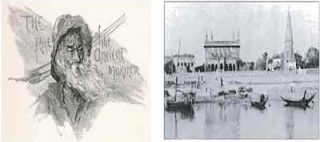1. Warm up activity:
□ Ask an elderly villager or relative how the river nearby was in his or her youth. Then compare the state of the river at present and write down the differences. Make a presentation in a group.
□ With a group of friends, make a survey of ponds/water bodies in your locality. Then ask an elderly person living in the area if there were more of them in his younger days. Imagine the reasons why the water bodies/ponds had been filled up and write them down.
2. Now read the four lines from Samuel Taylor Coleridge's poem The Rime of the Ancient Mariner and answer the questions that follow:
Water, water, every where,
And all the boards did shrink;
Water, water, every where,
Nor any drop to drink.
Coleridge' poem, a ballad, narrates the harrowing sea-voyage of an old mariner who at one point of his journey didn't have any water to drink because of a curse. Cursed or not, we know how important drinking water is in our life. We know we cannot survive without it. In fact two-thirds of our body is made up of water. Not for nothing is it said that the other name of water is life. Is there a crisis in our time with regard to access to clean drinking water? The United Nations in a meeting on the eve of the new millennium identified the drinking water problem as one of the challenges for the future. But do we need to worry about the problem as ours is a land of rivers and we have plenty of rainfall? Besides, we have a sea in our backyard too.
One of the sources of water in our country is the rivers. Rivers are everywhere in our life, literature, economy and culture. But are the rivers in good shape? Unfortunately, they are not. A few are already dead and several are going through the pangs of death. The river Buriganga is an example of a dying river. A report published in the Daily Sun describes what has happened to the river Buriganga and why. It's water is polluted and a perpetual stench fills the air around it But that is not what it was like before.
The report says that the river had a glorious past Once it was a tributary of the mighty Ganges and flowed into the Bay of Bengal through the river Dhaleshwari. Gradually, it lost its link with the Ganges and got the name Buriganga. The Mughal s marveled at the tide level of the Buriganga and founded their capital Jahangirnagar on its banks in 1610. The river supplied drinking water and supported trade and commerce. Jahangirnagar was renamed Dhaka which grew into a heavily populated city with a chronic shortage of space.
The city paid back the bounty of the river by sucking life out of ill According to newspaper report, the Buriganga is dying because of pollution. Huge quantities of toxic chemicals and wastes from mills and factories, hospitals and clinics and households and other establishments are dumped into the river every day. The city of Dhaka discharges about 4500 tons of solid waste every day and most of it is directly released into the Buriganga. According to the Department of the Environment (DoE), 20,000 tons of tannery waste, including some highly toxic materials, are released into the river every day. Experts identified nine industrial areas in and around the capital city as the primary sources of river pollution: Tongi, Tejgaon, Hazaribagh, Tarabo, Narayanganj, Savar, Gazipur, Dhaka Export Processing Zone and Ghorashal.
The river would need a monster's stomach to digest all the wastes mentioned above. There is a limit up to which it can put up with its cruel and thoughtless treatment. We the humans have successfully killed one of our rivers. There are other rivers in the country that are being subjected to similar thoughtless treatment. Unless we take care of our rivers there may come a time when we will cry 'water, water* and find it nowhere.
3. Collect some reports on the dying rivers in Bangladesh from newspapers and magazines. Write a paragraph summarizing the main points.
4. Make a survey of the water bodies in your locality and write a report on whether they are being properly protected or not.
5. In a group, collect the data on the average rainfall of the last three years and write a report on any changes in our rainfall pattern.
6. The following words can be used both as verbs and nouns. Make sentences of your own to show the differences:
a. waste
b. subject
c. release
d. marvel
e. shape
If you want to read the next lesson of this unit please click the link below:
Lesson 2: The Hakaluki Haor






0 Comments:
Post a Comment